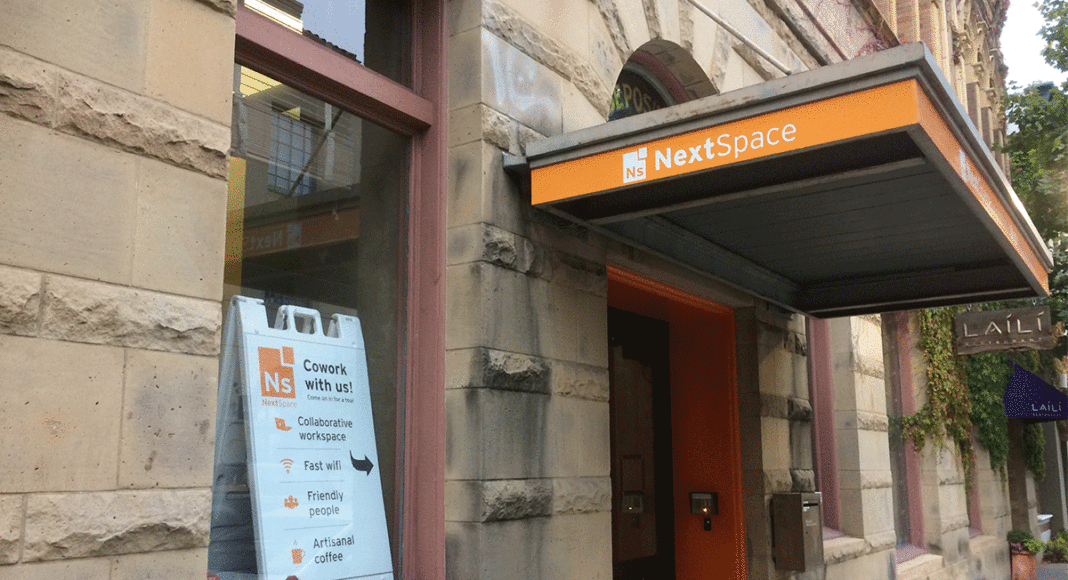NextSpace, founded in 2008 by Jeremy Neuner, Ryan Coonerty and Caleb Baskin—was put up for sale. And, for the past few weeks, it’s been under the watch of Pacific Workplaces, which has 18 locations that span from Carlsbad, California to Reno, Nevada. And now, Santa Cruz.
It’s a big shake-up for the local tech scene.
“Hindsight’s 20/20,” says Kurt Grutzmacher, who served as NextSpace’s third, and ultimately final, CEO. “We have a lot of things we’re pretty proud of. Maybe we tried to grow too fast. But again, that’s hindsight. There are probably a number of reasons why we could have been incredibly successful or not. I don’t think you can point to any one thing. It’s been a nine-year run.”
At a NextSpace happy hour on Friday, July 21, managers of Pacific Workplaces told members they would no longer be able to freely visit the San Jose and Berkeley NextSpace locations, at least in the short term. But the new parent company is exploring ways to make its 17 other locations available to NextSpace members, possibly for a fee. The management also promises technological upgrades soon, allowing people to more easily teleconference via the systems set up by Pacific Workplaces, which now owns those San Jose and Berkeley NextSpace locations as well.
The six other NextSpace locations—Venice Beach, Culver City, Chicago, an additional San Jose location and two in San Francisco—all closed in the past year or changed hands, most of them in the weeks before the sale.
Many members are interested to see what new ownership brings, and Coonerty, who served on NextSpace’s board, says he looks forward to remaining a member.
NextSpace launched during the early days of coworking, an idea that has evolved from a buzzword into a way of life, with Santa Cruz sometimes on the cutting edge.
Laurent Dhollande, CEO of Pacific Workspaces, calls NextSpace “legendary” and says his company learned from NextSpace’s approach. “NextSpace was an incredible success for the community. It was less of a commercial success,” he says.
With the help of Santa Cruz Sentinel columnist Wallace Baine, Neuner, the onetime NextSpace CEO, and Coonerty, now the District 1 county supervisor, co-wrote a book called The Rise of the Naked Economy: How to Benefit from the Changing Workplace. Neuner now works at Google with the department of Real Estate and Workspaces (REWS), espousing the benefits of coworking.
There’s no telling what decisions pointed toward the eventual sale, or when the company started down the path that led to that point. Did expansion a few years ago force the local company to lose sight of the region where it truly thrived? Neuner doesn’t think so.
“That was our model, to expand into other markets in San Francisco and Los Angeles and even Chicago,” says Neuner, who was CEO through 2014.
Grutzmacher says that at the end of the day, it all comes down to money, and with increased competition from well-funded alternatives popping up around the nation, NextSpace would have needed a lot of it. They realized it too late.
“The industry was evolving, and there were lot of things happening at the same time, and raising money is a full-time job,” says Grutzmacher, the company’s lead investor, who took over as CEO in early 2016, a little more than a year after Neuner moved on. “We were concentrating on the business.”
This, he adds, is all part of the world of investing. “Nothing is guaranteed,” he says. “Just make sure your winners are bigger than your losers.”
There’s no word on the size of the payoff, which is confidential. Generally speaking, though, shuttering several locations while selling everything else doesn’t scream massive profits.
“I’ll keep my day job,” Coonerty says.












the economy is crashing get your money out of the bank now! thats why business are changing hands all over the place, if not straight up going bankrupt. I know personally a few local business owners, no one is doing good! everyone is down sizing and the minimum wage hike is challenging more than just businesses who pay all employees minimum wage. Everyone is affected by the minimum wage because we all buy products from companies who pay employees minimum wage. So do those companies. So all those products have to be marked up. And the cycle of economy crashes in a country with a fiat currency continues. Do your homework folks, crashes happen every 10 -15 years in one form or another. Fact.